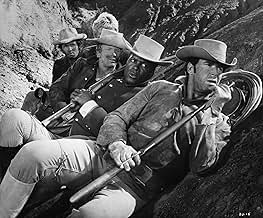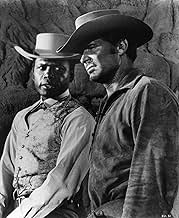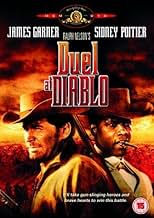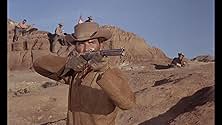CALIFICACIÓN DE IMDb
6.5/10
4.7 k
TU CALIFICACIÓN
En territorio apache, un hombre busca al asesino de su mujer india y una ama de casa abandona a su marido, para unirse a la tribu de su amante apache.En territorio apache, un hombre busca al asesino de su mujer india y una ama de casa abandona a su marido, para unirse a la tribu de su amante apache.En territorio apache, un hombre busca al asesino de su mujer india y una ama de casa abandona a su marido, para unirse a la tribu de su amante apache.
- Dirección
- Guionistas
- Elenco
- Premios
- 1 nominación en total
Ralph Nelson
- Col. Foster
- (as Alf Elson)
Armand Alzamora
- Ramirez
- (sin créditos)
Ralph Bahnsen
- Trooper Nyles
- (sin créditos)
Timothy Carey
- Deputy Clem
- (sin créditos)
Jeff Cooper
- Trooper Casey
- (sin créditos)
Kevin Coughlin
- Norton
- (sin créditos)
Robert Crawford Jr.
- Trooper Swenson - Bugler
- (sin créditos)
Opiniones destacadas
Lieutenant McAllister and a raw recruit of soldiers have to travel through Apache territory to deliver some much need ammunition to the awaiting Fort Conchos. Scout Jess Remsberg tags along with revenge on mind and horse broker / former trooper Toller who unwillingly receives an order to ride with them to finish off breaking the horses, if he wants the rest of his money. However McAllister and his small party find themselves trying to survive an Apache onslaught led by Chata, as the lady Ellen Grange that Jess rescued from the Apaches has something of importance to the chief.
A competently well-made and satisfying western that's highlighted by the prominent cast and exhilaratingly taut and unsparing action sequences. Ralph Nelson smoothly paces this drum-beating foray, with its adeptly bold and old-fashioned direction. His professional touch lifts the screenplay. Going a long way to giving it a real bravado feel amongst the gritty, dusty and sprawling rocky terrain, which is masterfully framed with a lot of ticker and claustrophobic channelling by cinematography Charles F. Wheeler. The main feature of the film that strikes a chord, has got to be composer Neal Hefti's effectively novel, melodic score that seems to match and illustrate the sequences and overall feel rather well, despite the uncanny tone for this type of film. I found the dynamic cues to be rather contagious. Albert and Michael M. Grilikhes' open screenplay (which is based on the Marvin Albert's novel, "Apache Rising") is pretty much to the point and a little lacking by simply going through the motions. But even with those vague moments, it still thrives on well-rounded dialogues from its sturdy script. In there are configurations of racism, and the unfair treatment of the Indians, but it's the personal confrontations and torment that makes for one gruelling exercise. It never lets any of this get carried away, but the starkly harsh nature stays throughout. The performances are richly devised, to stew up depth and realism due more to their favourable acting than in the way of the material. James Garner's winningly focused performance as rugged, seldom Jess is first-rate. Sidney Poitier classy turn as Toller is a different stroke and admirably good one. Bill Travers' growing performance is very strong and humane. Dennis Weaver eclectically solid. Bibi Andersson was mildly okay, but was hindered and the modest John Hoyt didn't see enough time as Chata.
Dated, but a well handled, compelling and tough as nails western, which finally shines through.
A competently well-made and satisfying western that's highlighted by the prominent cast and exhilaratingly taut and unsparing action sequences. Ralph Nelson smoothly paces this drum-beating foray, with its adeptly bold and old-fashioned direction. His professional touch lifts the screenplay. Going a long way to giving it a real bravado feel amongst the gritty, dusty and sprawling rocky terrain, which is masterfully framed with a lot of ticker and claustrophobic channelling by cinematography Charles F. Wheeler. The main feature of the film that strikes a chord, has got to be composer Neal Hefti's effectively novel, melodic score that seems to match and illustrate the sequences and overall feel rather well, despite the uncanny tone for this type of film. I found the dynamic cues to be rather contagious. Albert and Michael M. Grilikhes' open screenplay (which is based on the Marvin Albert's novel, "Apache Rising") is pretty much to the point and a little lacking by simply going through the motions. But even with those vague moments, it still thrives on well-rounded dialogues from its sturdy script. In there are configurations of racism, and the unfair treatment of the Indians, but it's the personal confrontations and torment that makes for one gruelling exercise. It never lets any of this get carried away, but the starkly harsh nature stays throughout. The performances are richly devised, to stew up depth and realism due more to their favourable acting than in the way of the material. James Garner's winningly focused performance as rugged, seldom Jess is first-rate. Sidney Poitier classy turn as Toller is a different stroke and admirably good one. Bill Travers' growing performance is very strong and humane. Dennis Weaver eclectically solid. Bibi Andersson was mildly okay, but was hindered and the modest John Hoyt didn't see enough time as Chata.
Dated, but a well handled, compelling and tough as nails western, which finally shines through.
What terrific production values—that trek across a hellishly barren Utah desert had me off the couch, running for a water pitcher. And catch all those cavalrymen, Indians, and wild horses, enough for at least ten more westerns. Then there's the great James Garner to headline, along with a spiffy Sidney Poitier. So, why isn't this a top-notch horse opera, given such promising prospects.
For one thing, there's about ten sub-plots too many. Heck, just the ordeal across the desert should be enough for most westerns without over-crowding the storyline. Sure, the script is making a good point about racism with Ellen's half-Indian baby. But do we need the soap opera sub-plot with husband Dennis Weaver that's mainly a distraction. Then there's Poitier showing it wasn't just white guys who won the west. And, of course, the screenplay has to carve out a large enough role for a second headliner. Add to that Garner's search for whoever scalped his wife that is sort of tacked on at the end, and we've got enough plot material for three more features.
Sure, the movie's heart is in the right place. But messages are one thing, while merging them into a fluid narrative is another, and here the sub-plots add to the general problem of too much storyline clutter. The root of the problem, I expect, was hiring too many name stars, even if Travers and Andersson are known mainly to foreign audiences. Speaking of the cast, Garner's unusual skills are largely wasted in a role any number of imposing presences like Clint Walker could have easily handled.
And I never thought it would happen, but by about the twentieth skirmish across the desert, I actually got a little bored with all the repetitive stunts and endless shooting. 'More', it seems, is not always better, and I suspect the lesson is there can be too much action even in an action movie.
Anyway, I don't want to simply dismiss the movie because of its excesses since there are also a number of good touches (Chata gets some respect as a leader of his people, even though we see him as cruel), along with the generous production values. I'm just sorry the movie doesn't succeed better given its praiseworthy side.
For one thing, there's about ten sub-plots too many. Heck, just the ordeal across the desert should be enough for most westerns without over-crowding the storyline. Sure, the script is making a good point about racism with Ellen's half-Indian baby. But do we need the soap opera sub-plot with husband Dennis Weaver that's mainly a distraction. Then there's Poitier showing it wasn't just white guys who won the west. And, of course, the screenplay has to carve out a large enough role for a second headliner. Add to that Garner's search for whoever scalped his wife that is sort of tacked on at the end, and we've got enough plot material for three more features.
Sure, the movie's heart is in the right place. But messages are one thing, while merging them into a fluid narrative is another, and here the sub-plots add to the general problem of too much storyline clutter. The root of the problem, I expect, was hiring too many name stars, even if Travers and Andersson are known mainly to foreign audiences. Speaking of the cast, Garner's unusual skills are largely wasted in a role any number of imposing presences like Clint Walker could have easily handled.
And I never thought it would happen, but by about the twentieth skirmish across the desert, I actually got a little bored with all the repetitive stunts and endless shooting. 'More', it seems, is not always better, and I suspect the lesson is there can be too much action even in an action movie.
Anyway, I don't want to simply dismiss the movie because of its excesses since there are also a number of good touches (Chata gets some respect as a leader of his people, even though we see him as cruel), along with the generous production values. I'm just sorry the movie doesn't succeed better given its praiseworthy side.
in an age when black actors were confined to black roles, this film shows Poitier in a role that could easily have been played by a white actor-plus he's the coolest dude in the movie.
Bill Travers doesn't have to do an American accent.
this was from a time that people believed that there could be major characters with foreign accents in the USA who weren't villains.
Of course the USA at this time, and at any time, had plenty of odd accents. Except in movies.
The credits are waaaay more imaginative that you'd normally expect.
The music is highly "different" The camera-work is very strange- all those overhead shots.
I love this movie, and is a film I can watch again and again. It's very stylised-the lines are delivered like they were from a comic book.
You know-the sort of thing Quentin T "discovered"
Bill Travers doesn't have to do an American accent.
this was from a time that people believed that there could be major characters with foreign accents in the USA who weren't villains.
Of course the USA at this time, and at any time, had plenty of odd accents. Except in movies.
The credits are waaaay more imaginative that you'd normally expect.
The music is highly "different" The camera-work is very strange- all those overhead shots.
I love this movie, and is a film I can watch again and again. It's very stylised-the lines are delivered like they were from a comic book.
You know-the sort of thing Quentin T "discovered"
Caught between Hollywood's traditional western genre and the revisionist western styles of the late 1960s and 1970s, Duel at Diablo seems both a little behind and ahead of its time. As an old-fashioned western, Duel at Diablo has traditional cavalry vs. Indian story line and well-executed, exciting battle scenes. Beyond this, the film also addresses racism and oppression towards native Americans in a complex and non-sentimental manner, through various inter-linked sub-plots. While the Apaches may be cruel and the instigators of attacks, it is clear that this is only because they have been oppressed to the point where they have no other resort. This is not a battle between "good guys" and "bad guys" and in the end nobody wins. Perhaps, the film could have delved a little deeper into the social and ethical issues it raises. At times, it appears that the movie itself is unsure whether it is primarily an action film or a message film. However, this is also the movie's strength as its messages do not detract from the story and action, and never appear simplistic or preachy as is often the case in westerns that take a sympathetic perspective on the plight of native Americans.
Meanwhile, the excellent, rhythmic and moody musical score by Neil Hefti, while unusual for a western, is well suited to accompanying the unrelenting action sequences and conveying the tragedy and doom of a society and individuals caught in a vicious cycle of conflict and racism. The casting of the film further contributes to making Duel a Diablo a strong, atypical western. James Garner, who up to then had always played amiable leading men, sheds his typical persona to effectively portray a tough and rugged frontier scout, bent on avenging the murder of his Indian wife. Equally effective and very cool-looking in a 3-piece suit, Sidney Poitier is an army sergeant turned businessman, whose color is on the surface only incidental to the story beyond a couple of subtle inuendos (that said, it is really left to the viewer's interpretation whether his race is significant to the story, and it is somewhat ironic to see a black man taking charge among a regiment of white soldiers in shoot-outs against Indians). Europeans Bibi Anderson and Bill Travers also seem strangely out of place, respectively portraying what could be a Scandinivian emigrant and a Scottish-born American officer. And Dennis Weaver, who up to that time was mainly known as a simple good guy in TV's Gunsmoke plays the part of a nuanced villain. Add to this the beautiful cinematography of wide desert landscapes, and Duel at Diablo is a superior, exciting, and socially-conscious western, not a great one, but certainly unique.
James Garner is a good lead in this rousing Cavalry v. Indians western. There are very good battle scenes between between the outnumbered soldiers and the attacking Indians. The underlying issues of prejudice add an interesting touch to the movie as well with James Garner's character struggling with the death of his Indian wife and the Bibi Andersson character struggling with raising her baby fathered by an Indian brave.
As in any good western, the scenery also plays an important part and the southern Utah settings are particularly striking. The musical soundtrack is a little off-beat for a western, but also very good. Dennis Weaver, Sidney Poitier, and Bill Travers all add to the movie with good supporting performances.
As in any good western, the scenery also plays an important part and the southern Utah settings are particularly striking. The musical soundtrack is a little off-beat for a western, but also very good. Dennis Weaver, Sidney Poitier, and Bill Travers all add to the movie with good supporting performances.
¿Sabías que…?
- TriviaJames Garner's first western since leaving Maverick (1957) and Sidney Poitier's first theatrical western.
- ErroresAs Willard hands his wife a gun, he says there are two cartridges in gun. However, it can be seen that all six chambers are loaded.
Bullet noses can be seen in the chambers on the left side of the cylinder but a minute or so later, the right side is on camera and shows 3 empty chambers.
- Citas
Ellen Grange: They all think that any decent woman would prefer to die than live as an Apache squaw. Maybe they're right.
Jess Remsberg: Death comes soon enough. Anyone who hurries it is a damn fool.
- Créditos curiososThe United Artists logo is sliced off the screen with a bloody Calvary Saber, slicing an "X" across the screen, revealing the opening scene. At the end, the same saber slices the live picture away, as (sort of) a fade out.
- ConexionesFeatured in Across 110th Street (1972)
Selecciones populares
Inicia sesión para calificar y agrega a la lista de videos para obtener recomendaciones personalizadas
- How long is Duel at Diablo?Con tecnología de Alexa
Detalles
- Tiempo de ejecución1 hora 43 minutos
- Color
- Relación de aspecto
- 1.66 : 1
Contribuir a esta página
Sugiere una edición o agrega el contenido que falta

Principales brechas de datos
By what name was Duelo en el cañón del diablo (1966) officially released in India in English?
Responda




































